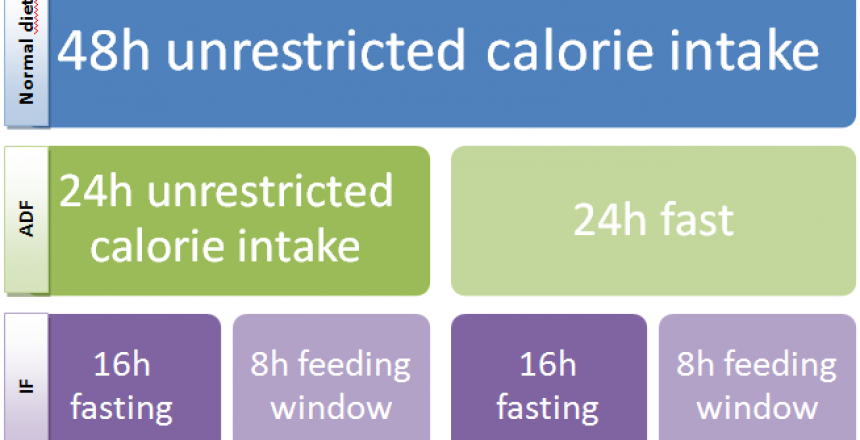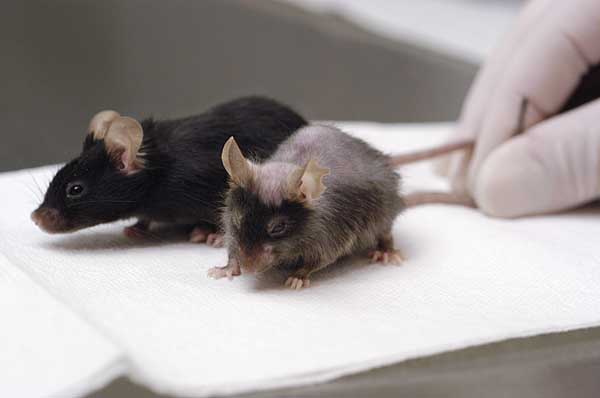Fasting boosts muscle mass and metabolism
The latest paper on calorie restriction (CR) as it relates to muscle shows that CR in middle-aged rats preserves muscle mass. It does this by activating AMPK, a cellular signaling mechanism at the center of a network that controls the aging process and which is crucially involved in lifespan extension. Preserving muscle mass and counteracting aging obviously go hand in hand, since loss of muscle mass is a prime characteristic of old age. In this recent study, CR preserved muscle mass in part by increasing levels of mitochondrial biogenesis; since old mitochondria are prime sources of oxidative stress and resultant inflammation, increased mitochondria mean not only more but better, younger mitochondria that do not release high levels of reactive oxygen species. Also importantly, in the muscle of animals subjected to CR, the machinery to burn fat, as opposed to burning carbohydrates, was upregulated.
Intermittent fasting has most, if not more, of the benefits of calorie restriction. The reason for this is simple: restricted food intake, whether from timing or CR, is beneficial, yet overall CR can lead to lower bone mass and lower immune function. Intermittent fasting does not involve decreased calorie intake, so it has none of these drawbacks. Most studies on fasting show that animals or humans who fast periodically consume the same number of calories as ad lib fed, they just consume them at different times.
How often and long should you fast?
How often should one fast, and for how long, to get the benefits of increased muscle mass, metabolic resiliency, and fat-burning physiological machinery?
Of necessity, we need to speculate on these matters, hopefully from a very informed basis. Although a number of studies on humans and intermittent fasting have been done, comprehensive ones on muscle function and the like have not, and most of the work has been done on animals. One can readily see that rats, for example, with a metabolic rate around 8 times higher than humans, respond differently than humans to a fast of the same duration.
If you work out in the gym – and if you read this blog, I assume that you do – you need to eat both enough calories and enough high quality protein within the 24 hours after your workout to sustain and increase muscle mass. Whey protein around the workout (right before or after) is superb for increasing muscle protein synthesis, and plenty of good protein such as from meat, eggs, yogurt, and so on during the next 24 hours should be optimal for muscle mass. You should eat at least 1 gram of protein per kilogram of body weight, which isn’t hard to do. (See the link for a full discussion on protein quantity, if you think that amount is too low.)
My own intermittent fasting schedule
My own intermittent fasting usually doesn’t begin until about 48 hours post workout, simply because the day after the workout, I feel somewhat fatigued and plenty hungry. But by dinner that night (one day after workout), I’m sufficiently rested and fed to start a fast.
The length of my fasts vary depending on a lot of factors, such as when my next scheduled workout is, and what else I have on my agenda for the day. Recently I’ve done several fasts of 20 to 22 hours, from about 6:00 P.M. to perhaps 4:00 P.M. the next day. There’s nothing at all heroic or even very difficult about that, and I’ve spoken to several people who practice 36-hour fasts. My more normal fasting duration is around 16 hours, that is, from the night before until noon the following day, taking usually one cup of coffee when I get up, and another or one of tea at mid-morning. If I’m fasting longer than 16 hours, then I’ll have more tea in the afternoon.
I lift weights once every 3 days. Therefore, given the above, I do a lengthy fast once every 3 days as well. I think this schedule works well. You lift one day and eat for two days, gaining muscle mass; then you fast on the third day, lowering insulin levels, increasing mitochondrial biogenesis, burning fat, lowering inflammation, and probably most of all, increasing autophagy. These are all life-extending and life-enhancing processes, and exercise itself also will do all these things, provided the exercise is of the right type, such as lifting and HIT.
Fasting strongly increases growth hormone levels
It’s important to note that fasting strongly increases levels of growth hormone in humans, by up to 5-fold, which preserves and even increases muscle mass, as well as bone mass. So we see from both the rat experiment discussed above, as well as from good human data, that fasting has a salutary effect on muscle and bone.
Making your own fasting schedule
Your workout schedule may vary. In particular, younger guys often lift three or more times a week. In that case, it’s important to eat plenty of high-quality food and protein on lifting days, and you may be able to squeeze in one or two days a week of intermittent fasting. That being said, regular 16-hour fasts, even on lifting days, ought to be doable, provided you don’t need to lift in the early morning. You can fast from dinner the previous night and through the next morning, then take your protein shake and hit the gym around noon. Plenty of guys do exactly this.
Summing it up
To sum it all up: both weightlifting (and HIT) and fasting have healthful, anti-aging effects on muscle, increasing both metabolic power and muscle mass. Adapting your fasting schedule to the circadian rhythm of the fed and fasted states can provide a powerful boost to health, longevity, and muscle. Starting from the mindset that fasting was just too hard, I now fast at least a couple times a week – and it’s pretty easy – and consider it a necessary part of my health routine, one leg of the tripartite regimen of dietary phytochemicals, exercise, and intermittent fasting.














29 Comments
Fantastic, succinct post, Dennis.
What do you think about doing mobility training, yoga, or what do you think about doing mobility training, yoga, or other recovery oriented workouts on fasting days?
Thanks, Luke. I think those kind of workouts, yoga, etc., are fine on recovery and/or fast days. Personally I’ve had to be careful with HIT workouts, because they tend to eat into my lifting recovery time and prolong it, but I think those others should be light enough not to do that, nor to wear you out much when you’re fasting.
Thirty years ago I lost over 100 pounds just by fasting. I was not exactly trying to lose weight; I saw my reflection in a window and did not want to live anymore. I reasoned that if I stopped eating, at some point before death occurred, I would be thin. I did not eat for four or five days, then settled into a routine of eating a Wendy’s salad every other day or every two days. In those days Wendy’s had a salad bar. Everything revolved around not eating. I remember pounding on the arm of my sofa at night and saying, “I will not eat” over and over.
For awhile nothing happened, then one day I had to pull my belt in a notch. Then I started spending a lot of money on pants: 44, 42, 40, 38, 36, 34, 32, 30, 29, 28. All during this time I jogged and played racquetball with no ill effects (except hunger :)). I remember one time while jogging I jumped up to touch a branch overhead, and I hung in the air for what seemed like forever. So this is what it is like to be thin, I thought.
People who heard about how much weight I had lost would drop by my office to stare at me like a circus freak. It was great!
Since nobody told me to stop, I kept going. There seemed to be no end to how much weight I could lose. Eventually my fat levels must have fallen below some critical threshold because bad things started happening. I developed shingles. I had trouble driving home from work because I could not remember where my house was. People were becoming alarmed. I had to start eating again.
Thirty years later I still look back on that experience as one of the greatest accomplishments of my life. Being thin is truly wonderful.
Of course, I gained it all back.
Shit, that was so inspiring, right up to the last sentence. Guess it pays to choose the slower, more sustainable path huh?
Mangan, if fasting is protective of muscle, why do the old bodybuilders like Arnie, when they do admit to gear, stress that they used it to hang onto muscle when dieting? G H may increase during fasting but doesn’t test drop? Is fasting only protective of muscle in a calorie balanced state?
One way to look at it is that those guys are super-competitive, and even marginal improvements can mean the difference between winning and losing. So yeah, gear will help build and retain muscle, maybe even better than HGH, but maybe we already knew that.
Last time I seriously committed to losing weight I lost a total of 20kg; the first 2/3rds was mostly fat loss, the last third took about twice as much muscle with it. While I got down to a fat level I was happy with, I wasn’t happy with the muscle loss. The first time I did it with diet alone, this time I’m keeping up the weights. I’m at about the 2/3rd mark again: 8.8kg off, probably at least 5 of fat to go. Hopefully the combination of IF and weights allows me to shed the last few kg’s of fat this time without too much muscle loss. At least this time the regime I’m using to lose it more closely mirrors what I’ll be doing after.
Dennis,
You turned me on to the whole fasting thing so I’ll keep you updated.
I do crossfit three times a week. (I usually powerlift three times a week but every three months I switch to crossfit).
I’m going to try a 5 day fast this week for giggles just to see what happens. I have very little body fat. I want to see how I feel as well. If the growth hormone dump is as big as the studies claim from day 2 to 5 I should be on cloud nine. All my buddies on GH tell me that.
Then I’ll switch to intermittent fasting and keep you posted. Perhaps it’ll push me through a plateau.
Daniel, very interesting. First of all, your workout routine seems like a good one, a bit unusual, but seems like it would keep one in great shape. I take it you mean that you alternate 3 months of lifting with 3 months of crossfit?
As for the 5 day fast, I’ll be interested to hear how that goes. I think there’s a good reason that virtually all religions advocate some sort of fasting, and that’s for the mental/spiritual effects, which are real. Valter Longo, a preeminent scientist in the study of aging at USC, advocates long fasts of the type you mentioned every 6 months or so. (Or maybe it’s Thomas Seyfried, the scientist who advocates for ketogenic diets for cancer, my memory is failing me at the moment.) But, I believe these fasts probably have much more benefit for older people, since they suppress IGF-1 and thus greatly reduce cancer risk; just putting that out there.
I’ve been IF-ing actively for 3 years now and I’ve been powerlifting 3-4 days a week over the same span. I fast 16+ hours every day (I relax on vacations or if my schedule is whack). I generally start feeding around 11am, workout over lunch (noon-1) on workout days, and eat my last meal with the family around 5pm, occasionally with a drink/snack to follow. This has been very sustainable for me (currently 32 years old).
I have experimented with fasted training and it seems to go well for the first few weeks but then I find myself dragging. Maybe if i did it once or twice a week only it’d work but I don’t feel the need right now.
philip
Thanks for that, Philip, a good example of what I meant in my post about combining regular weightlifting and fasting, as you say, sustainably.
Dennis,
I take it you mean that you alternate 3 months of lifting with 3 months of crossfit?
3 months on power with 1 month on crossfit. Alternating that way. I also mountain bike and boulder so I stay super active.
As for the 5 day fast, I’ll be interested to hear how that goes.
Started at 10 pm last night. I’ll give you an update after Wednesday’s wod.
As for the 5 day fast, I’ll be interested to hear how that goes. I think there’s a good reason that virtually all religions advocate some sort of fasting, and that’s for the mental/spiritual effects, which are real.
I always just wrote it off but based upon the modern studies you pointed me toward I’m assuming there must be some serious ecstatic effects.
And, since it doesn’t seem to be unhealthy, just the discipline it takes to make it thru the week is good for mental health I think.
Valter Longo, a preeminent scientist in the study of aging at USC, advocates long fasts of the type you mentioned every 6 months or so.
Right on. I was going to ask you how often to do it since that website you linked to (Intensive Dietary Management was a bore to read since it was so repetitive and never really cut to the chase about length or frequency.)
I did talk to one of the coaches at crossfit. He reported that he was weak 20-40 hours in but then had an incredible workout the 3rd day. After that he quit. But he was considering trying it again for 5 days after I told him I was going for it.
But, I believe these fasts probably have much more benefit for older people, since they suppress IGF-1 and thus greatly reduce cancer risk; just putting that out there.
Where I’m at right now I feel like keeping your insulin sensitivity high should be most people’s primary dietary concern. I mean that my reading has me thinking that muted insulin response seems to be responsible for almost everything.
I eat a massive amount of calories usually. My resting rate is so high. This is going to be interesting.
And great blog! I was always wondering when you would do a standalone on health and fitness related topics. Miscellany can only be held together for so long.
Thanks, Daniel, and great comments from you.
I made it 71 and 1/2 hours. I don’t have a lot of fat but I definitely burned some. I was incredibly weak after a great workout in the morning. I might have been able to make it five days but not doing the physical job I do, or, without some fat intake (and perhaps some post workout calories).
I never felt any different. Just hungry and weak the whole time.
I have spent the last week trying to gain back the weight I lost which I’m almost positive was about 5 pounds of fat and 5 pounds of water/muscle.
I’m feeling good now and I’m switching to a 24 hour fast once a week now.
A heroic feat, Daniel! Thanks for the report.
Great post! I think about this meshing between fasting and lifting all the time, so I’m especially interested in this. (Yes, I suppose I’m a health/fitness geek at this point.)
I can only think of one other comment, about this: “You can fast from dinner the previous night and through the next morning, then take your protein shake and hit the gym around noon.”
Agreed, this is often doable…but the lifting session takes more out of you. Fasted heavy deadlifts = incredible exhaustion. I find that I’ll consider doing most lifting sessions fasted….but deadlift days, I want some food first.
I think a lot of it is timing too. Even when eating first, doing my deadlifts before noon results in 50 pounds less.
I can rep 365 for 5 and pull 400 in the afternoon but that rarely happens in the morning no regardless of food intake.
I can rep 365 for 5 and pull 400 in the afternoon
Respect.
I wanted to deadlift 300 before my 60th birthday last month. Did it.
Excellent brother. True test of strength. Less than a fraction of a percent of men your age can do that.
So last night around 11pm was 26 or 27 hours in. I had a huge burst of energy and the food obsession turned into a tiny desire. I was up like every two hours and my mind was racing.
Now this morning I’m about 30 hours in and I don’t care about food. I can go easily the rest of the five days like this. I’m still a bit weak so we’ll see if that goes away. Brain has slowed down. I can focus like normal which I could not do yesterday.
Down to 172.4 from 178/179 on a normal day.
We’ll see what happens tonight.
I want to buy your book on chronic fatigue. Should I click on a link on this page? How do you make out best?
Thanks, Daniel, I guess best way is to click on the link on my books page.
My n=1 two cents on IF. I went about a year doing a once-per-week 24 hour (or up to 36 hour) fast. More recently, I have done about a year of frequent 16-18 hour fasts. Overall, for getting lean, building muscle and generally just feeling more energized, I found the 24-hour fasts much more effective. If one can get over the psychological hump of not eating for an entire day (and I preferred to try to go a full day without eating: i.e. last meal was dinner of one day, the next meal would not be until breakfast of two days later), I think it has several benefits.
One is that you don’t need to think about it every day of the week. Personally, I find it psychologically taxing to think about IF’ing every single day. The 24 hour fast allows you to just work through one day and then forget about it until the next week.
But the stronger reason is that with a 24-hour or longer fast, you are truly in the fasted state — when the body is really cleaning itself up, getting rid of unhealthy cells etc. — for a good long period of time. With the daily 16-18 hour fasts, you aren’t really hitting any fasted momemtun until 12 or more hours into it. A lot of times one ends up breaking the fast just when it is reaching the most effective point. Ultimately, if you IF every day or most days, you can theoretically hit a similar number of fasted hours as a 24-hour fast, but personally I found the benefits more pronounced on the latter approach. Now, if I can just get myself back to it again…
There are a couple of very interesting fitness/weightlifting gurus out there named Matt Perryman (author of Squat Every Day) and John Broz (Owner operator of Average Broz gym) – they both recommend that you squat/lift everyday. The quote I am reminded of are words to the effect “Imagine a family member is kidnapped and the ransom for their release is that you put 100 lbs on your squat. How often would you squat?” Well the answer is daily or perhaps even more often. I have used this mental model to get my squat up to 450lbs (age 52) How I did it was just keeping at it adding reps and weight as I went on. I also never tried to get psyched up for a lift – actually tried do the opposite to minimize the lift in my mind (I often equate a heavy set of squats to picking up a large bag of dog food – ho hum no big deal).
As I have progress I have noticed that I am much more tolerant of the stress of my workouts. I performed the following work out late A.M. after fasting for 18 hours – and extended the fast as I ran errands after my workout.
WeightXSetsXReps
Suat 425X2X4
425X2X3
405X1X5
Bench 255X5X 5
DL 365X3X3
Tri Ext 100X4X6
So the point I am making is that our expectations have a large effect on how we react to the stress of weightlifting and the stress of fasting. I still can’t believe the reactions that I get when I tell people that I fast – even my own primary care doctor told me I am going to give myself insulin resistance (Which is crazy because I have basically eliminated two markers for insulin resistance since I started fasting)
If you have a chance check out the youtube videos of Dr Jason Fung (intensivedietarymanagement.com)- He treats his T2DM patients with fasting -often weeks at a time. So if an elderly, obese. T2DM can handle fasting – I think it is reasonable to think that basically healthy people can handle it….
Peace,
@Joe_E_O
I think I’ve been doing this wrong…
I IF almost every day, or try to, by breaking my fast in the afternoon. Sometimes after working out. My workouts are mostly weight lifting and I’ll IF the following day as well. I think I am as “big” as I want to get anyway. I just want to burn off fat more than anything.
It looks like I should be calorie unrestricted for 24-48 after I work out (including breakfast). Or should I just eat when I’m hungry again, which for me has naturally become a 14-17 hour fast anyway.
Hello,
I have two questions regarding IF and training scheduling (I do low-volume, heavy lifts and Kettlebell ballistic movements 3x/week).
1- You mention training after a 16 hours fast, but how about a 24-36 hours fast (with maybe a protein shake beforehand)? If that’s not such a good idea, should I compensate with some peri-workout nutrition, like a shake of electrolytes and carbs, or skip the longer fast altogether?
2- If I train one morning, eat all the food I want through the day including decent amounts of proteins and carbs, would fasting or eating fats only the following day limit muscle recovery?
Thank you!